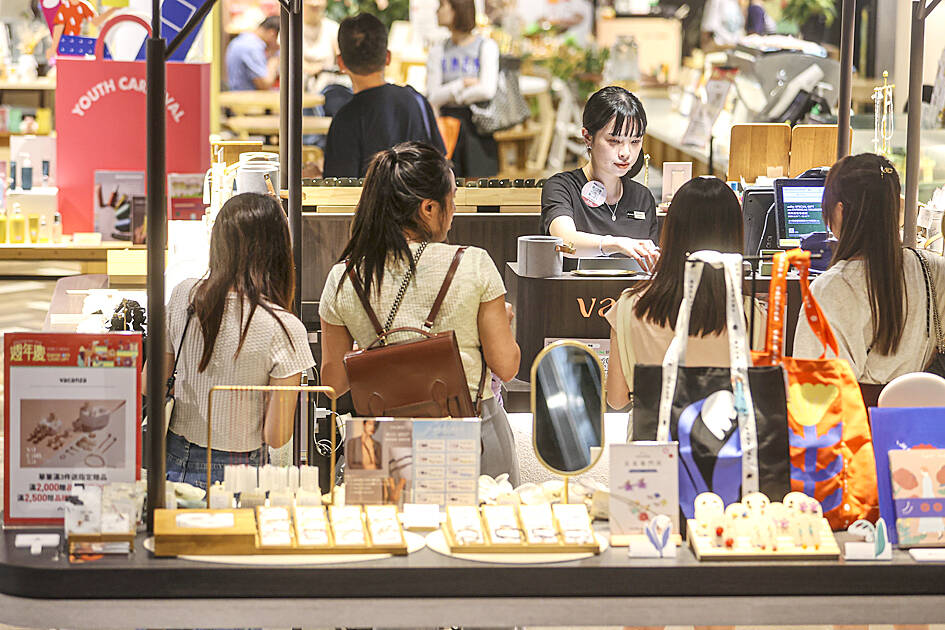The government’s business climate monitor last month flashed “red,” a quick return to a booming state after cooling a bit in July, as local firms benefited from inventory buildup ahead of new technology product launches, the National Development Council (NDC) said yesterday.
The latest composite score gained 4 points to 39, the best performance in 34 months, as the high sales season for technology products is approaching and demand for artificial intelligence (AI) has remained strong, NDC Economic Department Director Chiu Chiu-ying (邱秋瑩) said.
The uptick is expected to be sustained moving forward, she said.

Photo: CNA
The council uses a five-color spectrum to depict the nation’s economic state with “red” indicating a boom, “green” suggesting steady growth and “blue” signifying a recession. Dual-colors mean the economy is shifting gears to a better or worse state.
The boom came after key economic gauges such as exports, industrial production and overtime gained vigor, the council said.
Taiwan is home to the world’s largest suppliers of electronics used in smartphones, notebook computers, wearables, cars and cloud-based data centers.
Scores of local firms are responsible for making Nvidia’s AI chips, servers and other devices, while many others supply critical components for Apple Inc’s iPhone series, Apple watches and notebook computers.
Their business tends to pick up ahead of the Christmas season.
The index of leading indicators, which aims to project the economic landscape in the next six months, increased 0.43 percent month-on-month to 104.09, the council said.
The sub-indices on imports of semiconductor equipment, new construction floor spaces and local share prices posted upward cyclical movements, it said.
However, readings on business confidence, labor accession rates and money supply gave up some points, it observed.
Better order visibility led local semiconductor firms to increase their purchases of capital equipment from abroad to upgrade their technologies and expand capacity, Chiu said.
The trend would shore up private investment, a critical component of GDP, the official said.
The index of coincident indicators, which reflects the current economic situation, climbed 1.23 percent to 106.47, as seen in advances in electricity use, imports of machinery equipment, overtime hours, as well as revenues for retailers, wholesale operators and restaurants, it said.
Looking ahead, AI applications and high-performance computing are expected to grow more popular, bringing more business opportunities for local firms, who command global leadership positions in terms of technology processes, Chiu said.
That said, Taiwan still needs to watch out for uncertainty linked to the US presidential election in November, trade disputes between major economies and rising geopolitical tensions in the Middle East, the official said.

South Korea’s equity benchmark yesterday crossed a new milestone just a month after surpassing the once-unthinkable 5,000 mark as surging global memory demand powers the country’s biggest chipmakers. The KOSPI advanced as much as 2.6 percent to a record 6,123, with Samsung Electronics Co and SK Hynix Inc each gaining more than 2 percent. With the benchmark now up 45 percent this year, South Korea’s stock market capitalization has also moved past France’s, following last month’s overtaking of Germany’s. Long overlooked by foreign funds, despite being undervalued, South Korean stocks have now emerged as clear winners in the global market. The so-called “artificial intelligence

NEW IDENTITY: Known for its software, India has expanded into hardware, with its semiconductor industry growing from US$38bn in 2023 to US$45bn to US$50bn India on Saturday inaugurated its first semiconductor assembly and test facility, a milestone in the government’s push to reduce dependence on foreign chipmakers and stake a claim in a sector dominated by China. Indian Prime Minister Narendra Modi opened US firm Micron Technology Inc’s semiconductor assembly, test and packaging unit in his home state of Gujarat, hailing the “dawn of a new era” for India’s technology ambitions. “When young Indians look back in the future, they will see this decade as the turning point in our tech future,” Modi told the event, which was broadcast on his YouTube channel. The plant would convert

‘SEISMIC SHIFT’: The researcher forecast there would be about 1.1 billion mobile shipments this year, down from 1.26 billion the prior year and erasing years of gains The global smartphone market is expected to contract 12.9 percent this year due to the unprecedented memorychip shortage, marking “a crisis like no other,” researcher International Data Corp (IDC) said. The new forecast, a dramatic revision down from earlier estimates, gives the latest accounting of the ongoing memory crunch that is affecting every corner of the electronics industry. The demand for advanced memory to power artificial intelligence (AI) tasks has drained global supply until well into next year and jeopardizes the business model of many smartphone makers. IDC forecast about 1.1 billion mobile shipments this year, down from 1.26 billion the prior

People stand in a Pokemon store in Tokyo on Thursday. One of the world highest-grossing franchises is celebrated its 30th anniversary yesterday.